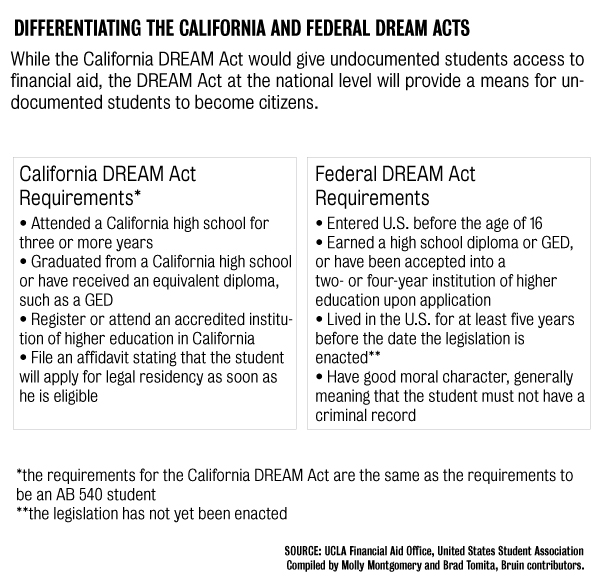Undocumented students in California may soon be able to receive financial aid under the latest California DREAM Act, which consists of two bills introduced to the California State Assembly in January by Assemblyman Gilbert Cedillo.
Assembly Bill 130 would allow undocumented students to receive privately funded scholarship money, including the Board of Governors’ fee waiver for community college students and most university scholarships at UCLA. This is unclear under current law, Cedillo said.
AB 131 would give undocumented students access to Cal Grants.
The bills follow the failure of the national Development, Relief and Education of Alien Minors Act in the Senate. Former Gov. Schwarzenegger also vetoed a similar bill last year.
Undocumented students who are already eligible to pay resident tuition at California public colleges and universities would benefit from the two new bills.
Cedillo said he introduced the bills because he believes they could benefit the state in the long term. The bills encourage undocumented students to go to college and become trained professionals, exactly what California needs in face of a retiring baby boomer generation, he said.
“We undermine our investment by not allowing … (undocumented students) to apply for scholarships,” Cedillo said.
For an undocumented student like David Cho, the new bills represent a potential opportunity for attending graduate school.
Cho, who is Korean and a fourth-year economics student, said he has struggled to fund his undergraduate education. In his second and third years, he commuted from South Pasadena every day by bus and train to attend UCLA.
This year, Cho is couch-surfing at a friend’s apartment.
Cho said he is now applying to graduate schools, including the UCLA School of Public Affairs, but if these bills do not pass, he will not be able to afford such an education at a UC.
These bills could also be a boon for 12 undocumented students who had to drop out of UCLA this quarter because they could not afford the fee increases, said Sofia Campos, fourth-year political science student and co-chair of IDEAS, an advocacy group for undocumented students.
Gov. Jerry Brown publicly stated that he would have signed last year’s vetoed bill. This means he would probably sign these new bills into law if the Legislature approves them, said Jeffrey Lewis, a political science professor.
“We’re looking forward to holding our governor accountable,” Campos said.
Both bills are likely to pass through the California Legislature because, together, they are very similar to last year’s vetoed bill.
If the bill concerning private scholarships is signed, it would need the UC Regents’ approval to come into effect at UC campuses.
David Alcocer, the associate director of student financial support at the UC Office of the President, said he could not predict what the regents would do in that case, but he pointed out that the last time the state passed a law concerning undocumented students, the regents followed the state’s lead and made a similar policy change at the UC.
An official analysis of the fiscal impact of the bills has not yet been conducted. Cedillo said since the first bill deals only with privately funded money, it would not cost the state.
On the other hand, the Cal Grants bill would have a fiscal impact, because Cal Grants are funded by tax revenue.
In light of California’s budget crisis, Clinton Eastman, a third-year political science student, said he objects to the bills. He said he does not think it is fair to allow undocumented students to access financial aid funded with taxpayer money.
If the Cal Grants bill comes into effect, there will be a small increase in the cost of the Cal Grants program to the state, Alcocer said.
The cost would be small in comparison to the total amount of money spent on Cal Grants by the state, he added.
Cedillo’s office expects the bills to come up for a vote by the beginning of the summer.
